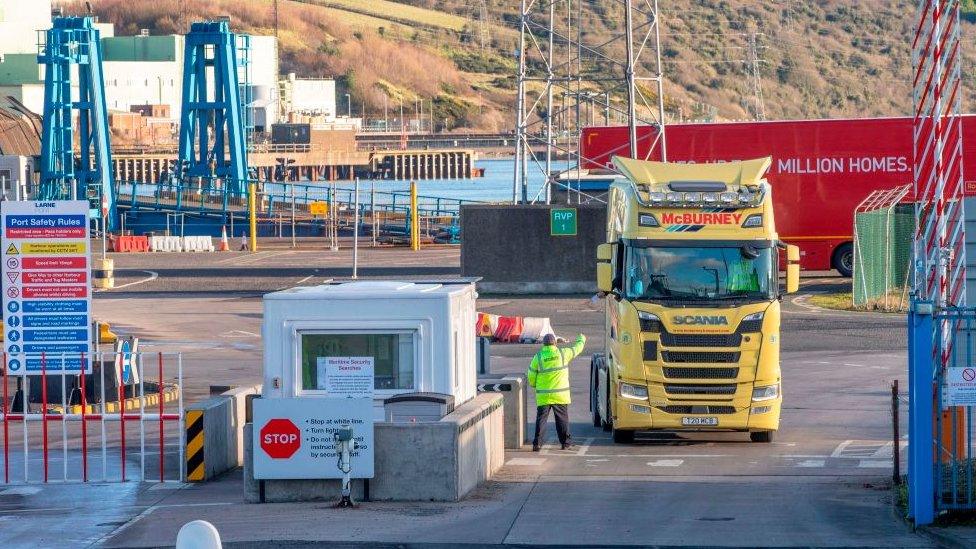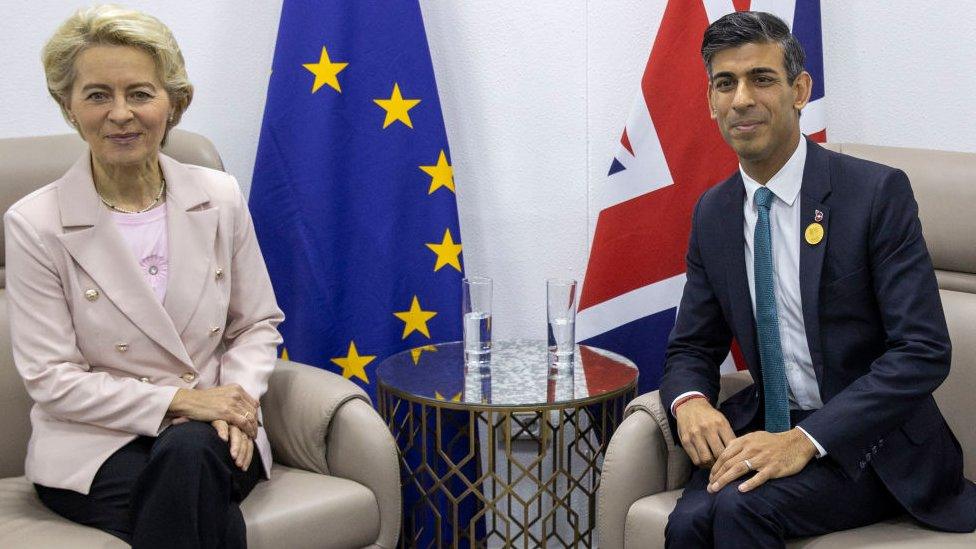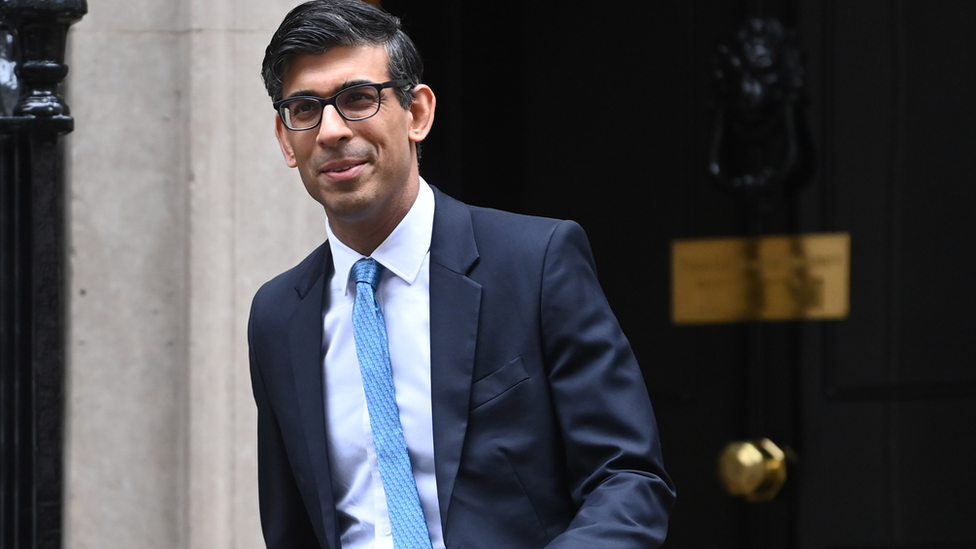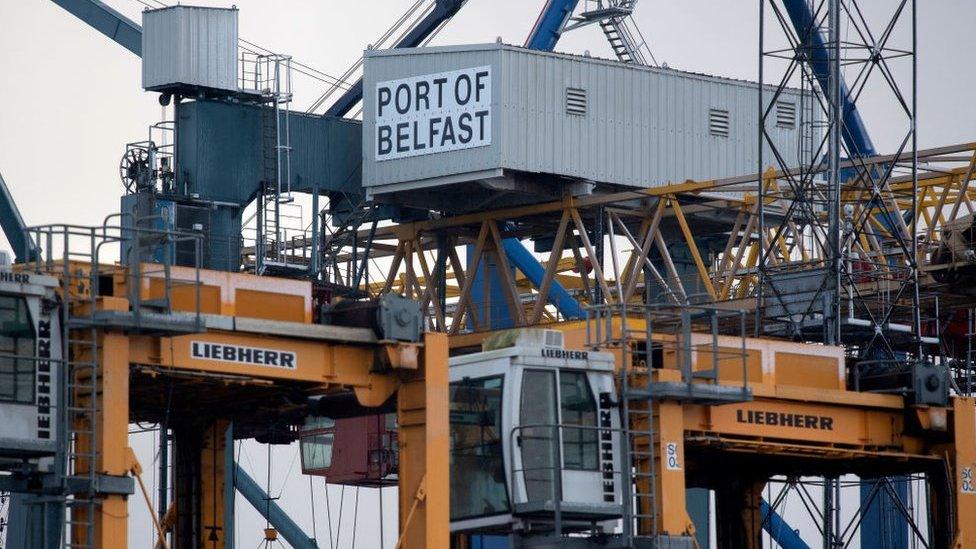Northern Ireland: What’s behind Sunak’s Brexit 'gamble' as deal nears
- Published

Diaries are being cleared, travel plans changed and everyone involved kept on high alert.
Even the most cautious officials are whispering that maybe, this time, it really is "on".
Negotiators, who are said to be "burnt out", will be on edge to see if a deal is done to change contentious post-Brexit rules for Northern Ireland, known as the protocol.
Monday is the mooted moment when a possible deal could be announced.
Big chunks have already spilled out through unofficial channels, about how checks on goods going from Great Britain to Northern Ireland will be eased, even eliminated.
Expect changes as well to rules on business subsidies and on VAT, along with a softened role for the European Court of Justice, the EU's top court, in policing trading arrangements.
And Northern Ireland could get a beefed-up role in saying which EU rules apply to them.
The Democratic Unionist Party, the largest unionist party in Northern Ireland, says it won't re-enter power-sharing at Stormont unless it is satisfied that a deal meets its seven tests.
Some Brexit-supporting Tory MPs are warning that unionism mustn't be "betrayed".
The political pushback Rishi Sunak faced this week led some in Brussels to fear the prime minister had lost control of the narrative.
'Sharks in Westminster'
The empty space left by the lack of an expected announcement earlier this week was being filled with leaks and red lines.
"How long until the sharks in Westminster eat him alive?" asked one EU diplomat.
Some on the British side were also getting impatient.
King Charles had been due to meet the President of the European Commission in the UK on Saturday, the BBC understands, but Downing Street says the visit was cancelled due to operational reasons. The meeting between the King and Ursula von der Leyen was not part of the negotiations between the UK and the EU.
All the while, Downing Street and the European Commission continued to insist talks were ongoing.
The EU's chief negotiator Maros Sefcovic hinted things were in more of a tweaking phase with i's being dotted and t's being crossed.
Privately, there were forlorn whispers in Brussels that Mr Sunak might have lost his nerve.
But there are also those who suspect that the government had to be seen to fight it out a little longer.
A question in the coming week will be whether Mr Sunak really can boast any last-minute gains.
Even UK officials admit that major concessions aren't likely at this stage, given Mr Sefcovic would need to seek a new set of negotiating instructions from EU member states.
So next week, if it all goes ahead, will be a test of Mr Sunak the political salesman.

European Commission President Ursula von der Leyen and British Prime Minister Rishi Sunak
His handling of it all so far hasn't exactly won wide praise.
One Brexit-backing Tory accused Mr Sunak of a failed attempt to "bounce" MPs into an agreement, leaving him "between a rock and a hard place".
They dismissed the idea the prime minister could rely on Labour votes to pass a deal in the Commons, calling it "potentially disastrous for the government".
Despite the criticism, there are insiders who point out that getting Brexit deals over the line is never a pain-free process.
For all the obstacles and warnings that Mr Sunak might be about to take a big political gamble at home, it's worth remembering the wider wins that may be on his mind.
Pulling off a deal could restore full UK access to the EU's flagship Horizon science research scheme.
And the big, obvious goal is of course getting the DUP on side and Stormont back up and running - maybe even in time for the 25th anniversary of the Good Friday Agreement in April.
That would be welcomed by the United States, which has made it clear that it does not like the alternative: the Northern Ireland Protocol Bill.
That's the legislation, launched under Boris Johnson, to allow British ministers to scrap parts of the protocol.
If Mr Sunak can't reach a deal with the EU, he'd be under even more pressure to do something he's shown reluctance to do - press ahead with passing the bill.
In response, the EU would probably relaunch legal action, which could be the prelude to a trade war.
So even though some say that the prime minister is taking a gamble, the alternative isn't risk free.
- Published25 February 2023

- Published24 February 2023
- Published18 February 2023
